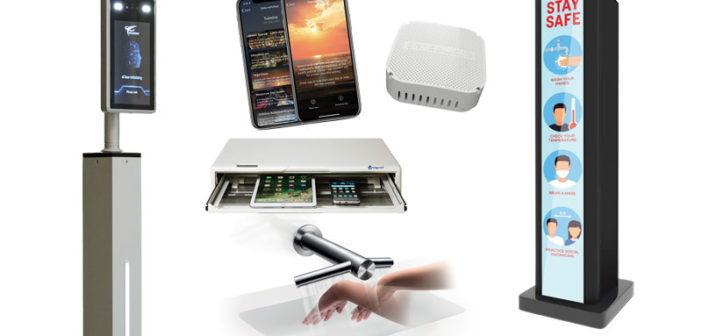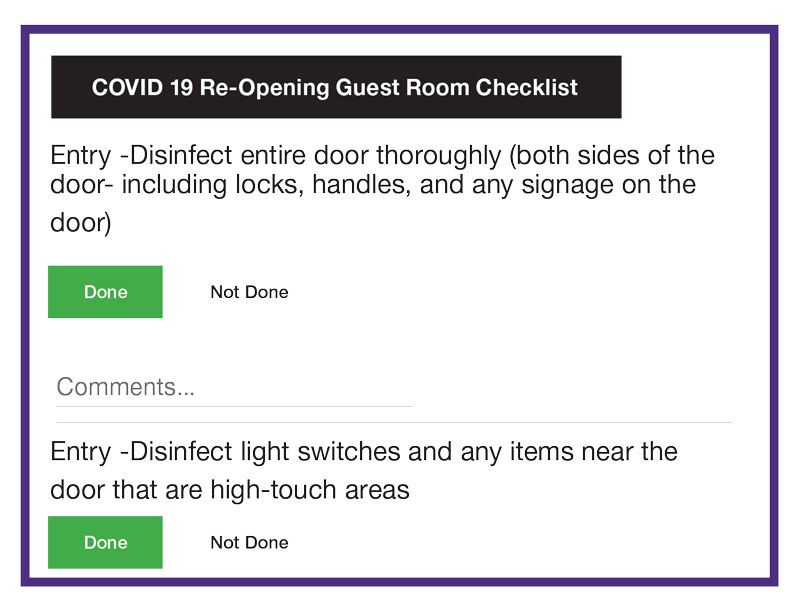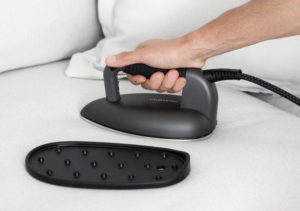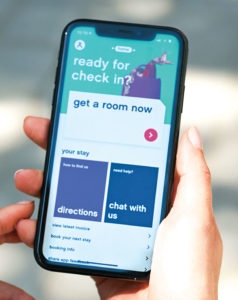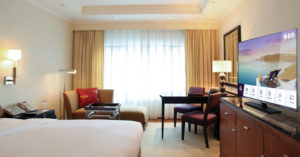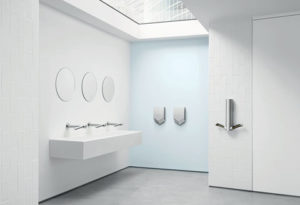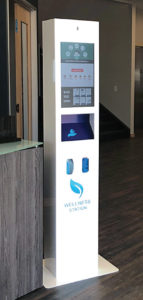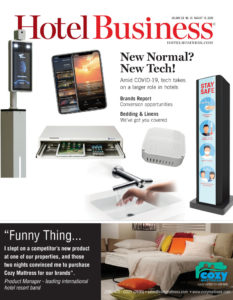Guests and employees alike want travel to resume, but the industry cannot recover if consumers don’t feel confident that they’ll be safe. Research from Deloitte Digital found that 84% of guests want personal control of cleaning, 70% want to know hand sanitizer will be available at all entrances, 80% prefer remote checkout, and 81% think follow-up communications on health concerns stemming from their visit are very or somewhat important.
Safety is key to managing the crisis, and technology plays a crucial role in providing that sense of security—both physical and emotional. Whether mobile check-in and checkout, advanced cleaning technology, touchless communications or back-of house systems designed to optimize safety and efficiency, there are a plethora of solutions for hoteliers to choose from as we navigate this new normal.
“Guests today have a renewed focus on health and safety, so when they decide to leave the comfort of their homes and book a hotel, they want to feel that same level of safety during their stay,” said Michael Levie, COO, citizenM Hotels. “This means increased cleanliness and hygiene measures, less direct contact with other people, but still a warm feeling that makes a hotel stay special in the first place.”
This is important for employees, too. Like many organizations in the industry, Hersha Hotels and Resorts launched a health and safety program, Rest Assured. Matthew Lobach, Hersha’s director, sustainability, noted, “Through our five-point program, advanced cleaning practices are complemented by innovative technologies to streamline the guest experience and support transparent communication before and throughout our guests’ stays… For employees, we have provided extensive training for all associates to ensure they are well informed, comfortable and confident regarding the health and safety at our hotels.”
While hotels are investing in technology to aid safety and cleaning practices, as well as create more social distancing, Levie noted, “Any tech innovation or update should enhance the guest experience and contribute to a frictionless stay—and the same goes for the tech updates citizenM made as a response to the coronavirus. These tech innovations will ensure that guests can have a minimal-fuss experience where they feel safe and are able to decide for themselves the level of contact they wish to have with our staff.”
“The current situation is clearly accelerating the adoption of touchless, contactless services, including digital key,” agreed Kerry Ranson, chief development officer, HP Hotels. “Another example has been the rapid adoption and expanded use of real-time messaging systems like Kipsu. Guests can receive instant notifications when their rooms are ready, fitness centers have capacity, or restaurant occupancy is optimal for social distancing. We can also offer menus and ordering from personal devices.”
In addition to contactless solutions, Bob Habeeb, founder/CEO, Maverick Hotels & Restaurants, highlighted the advantage of cleaning technologies. “We’re learning that human beings have not been able to identify all of the places that germs and these microbes can hide, and we’re probably going to use microbes both to measure cleanliness and drive cleanliness,” he said. “Every day, there’s some new gadget that sanitizes the guestroom through everything from foggers to UV light, and there’s no question there’s going to be a big demand for that in the future.”
Habeeb also noted that these technologies and high standards could create a big distinction between hotels and home-sharing. “We’re going to be using technology to measure the microbial of every guestroom, but Airbnb can’t offer that,” he said. “You can’t control people’s private residences when they put them on this shared platform.”
David Chestler, senior managing director, distribution and technology, ProVision Partners International, added, “If I didn’t have technology, I’d sure be investing in it right now.”
He noted that the major brands, associations and hotel companies have come out with checklists for safe reopenings. “We’ve seen a number of companies build hospitality checklists into devices and software so that housekeeping protocols could be followed and you can do the certifications and testing,” he said.
But the industry is still figuring a lot of things out—such as the fact that many hotels are choosing to let hotel rooms sit unoccupied for a period of time in between guests. “No system [was]really configured to have inventory set rates and also determine a checkout, turnaround and taking rooms out of inventory,” he said. “There are a number of companies trying to figure out how to support that.”
Ranson agreed that technology partners have worked hard to come up with solutions. “All of our technology partners and vendors have worked feverishly to provide us with items that are needed quickly, while coming up with ways to pivot, when required, due to rapidly changing demand cycles,” he said. “For example, our payroll and scheduling technology companies have proved extremely agile and responsive in helping us prepare needed analyses and documentation for staff management and PPP loan programs across our entire managed portfolio.”
Advanced cleaning solutions
First and foremost, technology is helping hotels to keep spaces cleaner.
“Guestroom cleanliness is the most important thing in today’s environment as it relates to guest satisfaction scores for a hotel,” said Parminder Batra, founder & CEO, TraknProtect. “They want to know hotels have cleanliness protocols in place—and these aren’t simply to clean more often but to also include use of additional measures such as electrostatic sprayers, UV light units, etc. They want to have these measures communicated to them pre-stay to build trust. And they want to know that those measures are being followed—things like receiving information about when the room was last cleaned, for how long and what was used to clean the rooms is critical to continue to build trust.”
Mark Beeston, VP of sales, Vioguard, added that guests are more aware of cleaning solutions today. “High-tech products that are proven to eliminate bacteria and viruses in an efficient way, without the chance for human error, will give customers a sense of comfort and security,” he said. “For example, the fact that UV-C light is a better cleaning solution than traditional chemicals is more common knowledge today than ever before. Because of this, people will be looking for the hotels that are explicitly providing this technology in their updated protocols.
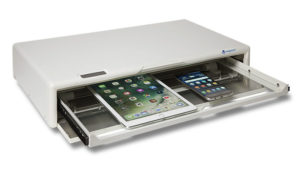
Hotels are placing Vioguard’s Cubby+, which disinfects items with UV-C light, at check-in to assure guests safety is a priority.
“In many cases, the technology can and should be visible to guests as this creates an extra sense of security when visiting a hotel,” he added. “For example, our Cubby+ is being used at select properties at check-in to disinfect key cards and other items such as phones, walkie-talkies and remotes, which is further assuring customers at check-in that the property is taking the necessary precautions to ensure the safety of their staff and guests.”
He noted that while the company’s UV-C technology mainly catered to healthcare and medical facilities before the pandemic, it has seen an uptick of more than 1,000% in sales geared toward other corporate entities with a strong focus on the hospitality industry.
Air quality is, of course, important. Levie noted that all citizenM guestrooms have direct fresh air in and out, with a maximum of air extraction and fresh air inflow. “The same approach is taken in all of our public spaces—something rather unique and one of the many benefits of the modular building approach we have taken,” he said. “Furthermore, we have bought electric air guns for sanitation of shoes and luggage in the front of the house, also to be used at the loading area where we receive all goods.”
Lobach added, “As part of our cleaning protocols, we have increased the frequency of cleaning with advanced cleaning techniques that utilize electrostatic sprayers, UV light technology, and HEPA-filter air purification.”
Virus Elimination Systems provides turnkey air treatment solutions for new and existing facilities nationwide. Principal Dennis Constanzo noted that there are a number of available and reliable technologies on the market. “Depending on the HVAC system of each hotel, our engineers will recommend an option,” he said.
These include UV lights installed in the HVAC system, HEPA filters, oxidation systems and ionization systems. Each has their benefits and disadvantages. For instance, Constanzo said, UV lights and HEPA filters are highly effective when used properly, but UV lights generate heat, may require major retrofits and upgrades to the electrical infrastructure and require high-intensity UV light (approximately 3,000 watts per hotel room). HEPA filters, he noted, require a higher static pressure (the motor or the fan coil unit of the HVAC system has to be replaced), should be replaced every 30 days and may also require a retrofit.
Constanzo said oxidation systems actively decontaminate air without requiring the air to go through one cycle of return plenum; actively decontaminate surfaces; and require no upgrade to electrical infrastructure, but the catalyst for the oxidation is required to be replaced every two to four years, and proper air distribution is required to cover every cubic centimeter of space. Ionization systems have many of the same benefits and disadvantages of oxidation systems.
Within the room itself, there are ways hotels can cut down on risk, such as taking out paper and pens or decorative pillows. But while hotels can take out many products from the rooms, there are still many high-touch items in the room that need to be cleaned.
“A Laurastar iron is 15-times more powerful than the standard iron and will leave fabrics and surfaces completely sanitized,” said Philipp Ueltschi, president of Laurastar US. “This certification from Microchem Laboratory makes Laurastar products a simple, efficient and easy way to eradicate any doubt guests may have about returning.”
“In terms of sanitization, a majority of hotels right now are reliant on housekeeping to wipe down surfaces in a room with disinfected product. This is scary as I’ve seen blue light video recordings showing the amount of coverage that is achieved with this method, and it is nowhere near enough,” said Stephen McKay, SVP, hospitality, national business team, DMR, Global for Almo Professional A/V. “A fogging kit helps take care of this as the coverage is even and it can be sprayed on windows and electronics.”
Adria Levtchenko, co-founder/CEO of PurpleCloud Technologies, added that solutions like PurpleCloud’s Covid Response (CR), which helps hotels complete sanitation checklists, facilitate contact tracing and track training progress, can also aid better cleaning systems. “All of the checklists are timed, so if the checklist is getting done too quickly, we can flag it as something that might not have been properly sanitized,” she said. “If you do just a couple of quick swipes with a Lysol wipe down a handrail, you probably missed a lot of the handrail.”
David Hill, Dyson design manager, RDD environmental care, professional & lighting, said that it’s not enough to clean—guests need to see that it’s been cleaned. “As part of this, we’ve seen increased interest in our purification technology that features a sealed HEPA and activated carbon filtration system that captures 99.97% of particles as small as 0.3 microns,” he said. “Many of our whole room purifiers feature a screen on the front of the machine that shows real-time indoor air pollution levels. Making invisible air pollution more visible via live reporting on machines can give guests a sense of security as they can monitor the quality of the air they breathe.”
Serene Al-Momen, CEO and co-founder of Senseware, agreed. “It’s understandable that guests would be concerned about health and safety,” she said. “Because both the viral threat and mitigating solutions are invisible, hotels need to not only ensure that their HVAC system is providing the best possible air quality and ventilation, but also instill confidence in guests that these safety measures are effective. Real-time air quality monitoring technology that shows the infection risk of an indoor space can give guests that confidence and help hotel managers take corrective action if necessary.”
Al-Momen added, “In the long term, hotels will start pursuing an aggressive, layered approach to surface and air sanitization. This would include the base layer of regular cleaning efforts in tandem with innovative new technologies such as self-disinfecting surface coatings and human-safe far-UVC lights, as well as air quality monitoring technology that ensures that no invisible risk factors are present. This combination of continuous sanitization measures with monitoring technology will give staff and guests peace of mind to reopen with confidence.”
Health checks
Like many businesses, hotels are investing in technology that can take the temperature of guests and employees in a socially distant way.
McKay noted, “Facial temperature scanning is critical to screen patrons and give them a sense of trust. I recently traveled and stayed in a hotel where this wasn’t being done and that made me feel uneasy. There are touch-free temperature-taking monitors that simply have the guest lean forward toward the display. The temperature can be stored daily and kept on record through an analytics system. They are ideal for entryways—at a front desk, before getting on an elevator, or at a host stand prior to entry into a restaurant, nightclub or theater.”
Chris Swanger, regional VP, eConnect, noted that his company’s eClear contactless thermal screening solution simultaneously takes a guests temperature while automatically verifying that they are wearing a face mask. “It has had tremendous benefits to their operation by not only making their employees feel comfortable about returning to work but it also lets their guests know that they are taking all the possible safety measures,” he said.
He noted that hotels should be sure to include messages about these types of safety protocols in future marketing campaigns, as guests will make reservations based on that.
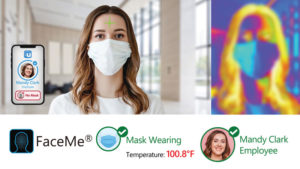
Face mask detection software, like CyberLink’s FaceMe, helps hotel guests and employees adhere to local mandates.
Mike Kosla, VP of hospitality, LG Business Solutions USA, added that these types of solutions can easily be incorporated with on-property messaging, too. “LG offers digital displays that can be used for wayfinding and to inform guests about local health policies, wellness kiosks equipped with a thermal scanner for temperature readings, and contactless interactive solutions controllable by guests through their personal mobile device with QR code links or voice controls—all of which create peace of mind for travelers and hotel staff alike, while minimizing unnecessary interactions between them,” he said.
Dr. Jau Huang CEO, CyberLink, maker of FaceMe, said that once a hotel knows if a guest has a high temperature or not, they can take action.
“If any guest does not pass these checks, staff could be notified and could take proper action, such as offering the guest a mask to wear or bringing an on-site doctor in for a more thorough medical screening,” Huang said. “The same technology can enable a number of contactless use cases to further minimize the risk of transmitting the virus. A guest opting in to register their face could use it as their ID for checking in at the hotel using a touchless kiosk, accessing elevators to automatically be directed to the right floor, opening the room door and even for frictionless payment at checkout.”
Contactless guest experience
That’s another key component to hotels’ COVID-19 technology strategy—a contactless experience.
“Interaction with guests has always been a hallmark and strength of our industry. With this pandemic, we have to go about it in new ways, whether it’s mobile check-in and contactless payments or digital menus for food and beverage,” Ranson said.
Levie noted, “We were able to fast-track upgrading our technology efforts to create a contactless experience, which included the launch of an app whereby guests can open their rooms or create a keycard; bypass the check-in kiosk and passport scanning; control their room (usually done via an in-room tablet); order F&B; and opt-in/out of housekeeping.”
Dewey Weaver, owner, InterMountain Management, noted that his company is in the process of eliminating the front desk. “You’re going to be able to check in either through your phone or kiosk,” he said, noting that there will still be someone in the lobby. “We [don’t want to] lose that hospitality element—but we’re going to have to do business differently if we’re going to stay profitable.”
Lobach said that a recent survey found that 88% of travelers feel that social-distancing measures are very or somewhat important—and that’s not just about check-in.
“Many guests who want to continue their fitness routines while traveling may prefer a workout routine in their room. Therefore, in many of our hotels, we are making fitness equipment available for guestroom use,” he said.
“We have seen early success with our mobile dining options for guests to gain access to digital menus through in-room televisions and on their phones to minimize contact with our F&B associates when ordering in-room dining or at one of our outlets,” he added.
Meka White Morris, CRO at Tappit, noted that contactless payments are an easy step for hotels to take: “The implementation of cashless systems can help facilitate transactions that seriously cut down on the likelihood to spread germs.”
This also has benefits beyond cleanliness. “By removing cash, hotels and resorts are finding technologies that offer a wealth of data that can be used to create a seamless experience for guests and a fully integrated customer view, allowing for a personalized guest experience, which in turn deepens the relationship between hotel and customer, driving loyalty,” Morris added.
Communication is key when it comes to social distancing—whether through digital signage or an app.
“Guests need to feel confident knowing the property they are staying in has a well-planned protocol for sanitation. This information must be displayed prominently throughout the hotel,” McKay said. “Technology and digital signage play an enormous role in making this possible.”
“Digital signage has always provided a great means for communication given the fact that it’s flexible, has different viewing distances, and you can manage content and keep it relevant and up to date,” said Jonas Tanenbaum, VP of hospitality, Samsung Electronics America. “So what might have a few weeks ago been wayfinding, now can communicate safety, cleanliness or other protocols to guests as they enter a hotel.”
Safety information can be communicated other ways as well. “Technology that provides pre-stay emails and texts outlining cleanliness protocols being implemented are important to start building trust with a guest,” Batra said.
Alisdair Luxmoore, director, Vamoos, noted that app solutions like Vamoos let guests access WiFi information, set up “do not disturb” signs to manage their privacy, check in and check out, and instant message with staff. “Not only does the Vamoos app help guests feel in control, but it actually reduces the two biggest safety concerns: exposure to people, and the need to touch surfaces/items,” he said. “The best part is that for the guests, this is not only safer, but will provide them with an enhanced level of service as they have all the relevant information they need at their fingertips.”
Kosla noted that when it comes to objects in the room, LG has partnered with Clean Remote to offer one free “clean” remote with each LG hotel TV purchase. The Clean Remote is designed to be safer and more durable thanks to a nonporous, sealed membrane surface that can reduce bacteria and germs by as much as 99% compared to traditional remotes.
Gal Bareket, CEO at Routier, said that contactless technology, “with its advanced AI-based features, can also enable the ability to automatically and proactively initiate conversations with all guests at the same time and in real time. This can, for example, ensure that they are provided with relevant local safety requirements and security information, allowing hoteliers to mitigate risks, set the right expectations with all types of guests and constantly leave a line of instant communication open in case an emergency arises.
“AI-based communication technology can further instantly update guests over when their room gets cleaned, the safest areas to go to and any regulation updates as they evolve, ensuring that safety requirements continue to be adhered to while maintaining a safe means of communication that does not place guests or staff under any unnecessary increased risk,” Bareket added.
Apps can also help guests ensure they’re keeping their distance from other guests, in addition to keeping their distance from staff.
Shawn Tarter, president, RealTime Reservation, said, “One of the most common questions we got seemed to be, ‘How can we implement social-distancing measures without completely eliminating certain amenities or activities altogether?’ The answer to that became clearer after months of development and research: a Social Distancing Module that completely integrates with any hotel or resort property and provides real-time updates that include any changes in availability.”
The module enables hotels to limit the guest capacity throughout their gym, pool, or beach areas by using dynamic availability, time slotting, and dynamic pricing; automate all guest bookings in order to reduce any unnecessary guest interactions; and allow for contactless F&B ordering, among other things.
Tarter noted, “Having the ability to manage booking limits will allow each hotel to reassure their guests that proper social-distancing measures are always in place (regardless of what they’re booking).”
Touchless technology isn’t just for phones and screens either. “Restrooms will also be a critical area for hotels to demonstrate their commitment to a hygienic guest experience,” Dyson’s Hill said. “Providing touchless solutions in public restrooms will reassure guests they can continue to practice good hygiene while on the go. We’ve heard a lot about how crucial proper handwashing is during this time to stop the spread of bacteria and viruses, but hand drying is equally as important. Wet hands can spread up to 1,000 times more bacteria than dry hands.”
He also noted that hotels could switch our faucets and paper towel dispensers for all-in-one faucet and hand dryers. “Coupled with touchless solutions like automatic flushing toilets and automatic hand soap dispensers, you’ve created a restroom that is nearly completely touchless,” Hill said.
Improved back-of-house
Technology that the guest doesn’t see is important too. Anything that can keep employees safe or help them be more effective—especially as many hotels are still understaffed—is critical.
“What we’ve noticed now is every property across the board, regardless of if they’re full or not, are doing a lot more with a lot less people,” PurpleCloud’s Levtchenko said. “And you’re also doing that in a really risky environment with COVID, and there’s all kinds of new brand promises that they have to learn and deliver. What we’re trying to do is make sure that if you are a front-desk agent and you have to help out with housekeeping because you don’t have all those different staff members anymore, that you are able to just jump right in and know what to do despite not being trained, and also be safe.”
The software also enables messaging between employees. “This enables people to just work smarter without having to pull anyone else who might be the expert in a certain field away from what they’re doing,” she said. “You can also use messaging for social distancing. A lot of people are using it for scheduling out breaks in a very spread out manner.”
It can also help with contact tracing. “We know every room that someone was in so if you got COVID or someone around you has it, we know where you’ve been and that those rooms might have to be cleaned or disinfected. Or, if a guest says they got COVID while they were staying there, you can see which employees were in those areas so they can self quarantine as well,” she said.
Chestler noted that dormant rooms and increased cleaning also factor into increased costs for the hotel. “How are they bundling these increased costs into fees, whether it’s resort fees or into your room revenue?” he asked. “Do we need to have someone on every floor so we can provide the managed use of the elevator and the cleaning standards? There’s a cost to that. My $80 per night ADR just shot up to $94 per night. Am I increasing my fee to cover all the cleaning costs I have?”
Automated technology, he noted, can help with that.
How to determine what to buy
“COVID is impatient, and it doesn’t discriminate as to how well hotels have done financially, or what funds they have available for these immediate and spontaneous investments,” Levie said. “Safety comes at a (pricey) cost.”
So, how then, are hoteliers determining what has the right ROI?
“The only ROI we are looking for is ensuring the health of our guests and hotel teams,” Levie said. “It is just as simple as an investment during construction into a water system, or WiFi for that matter. It is a new ‘must’ and we are trying to obtain as much information and evidence on the effectiveness of the health and safety devices we are purchasing. We also activate experts in the field to assist us.”
Habeeb added, “Our brand partners are going to have a lot to do with [choosing technologies]because they’re very good at testing technologies and then endorsing them or not.”
Ranson noted, “Technology investments that promise longer-term ROI, as well as being almost essential during this pandemic, are keyless entry, touchless meal options, and WiFi capacity and signal quality. The latter is extremely important as more and more communication is being done wirelessly. Having the ability to expand bandwidth when needed is, and will be, key.
“We also see continued opportunities in advanced accounting, payroll and scheduling software that can integrate across a full range of human resources and management functions, at both property and corporate levels,” he added. “Similarly, expanded approaches to business intelligence—think of it as revenue management on steroids— will play a significant role in pricing decisions in these fast-moving, uncertain times.”
Of course, hotels still need to be cautious with any new technology. “Every technology we champion opens our lives up to invasion,” said Habeeb, noting that connected devices offer new avenues for hackers to try to harm a hotel’s business.
Future outlook
The pandemic won’t be around forever but it will have a lasting impact on technology’s role in hospitality.
“This is a great opportunity to make the changes that we’ve known we’ve had to make for some time,” Weaver said, noting that kiosks didn’t work a decade ago, but they can now. “Half of my hotels are not prepared to take mobile check-in. Well, that’s where I need to spend the money this year… I think the time has come when we can do some things that might not have been popular 12 months ago.”
Habeeb agreed. “The brands were getting into this no-check-in experience before COVID and that had received some consumer acceptance, but not overwhelming—but I think this will certainly spirit that,” he said.
“The pandemic is accelerating many trends that were already in motion, as both operators and guests want to work or stay in an environment that is as healthy and safe as practically possible,” Ranson said. “Direct check-in; the digital key; remote control of in-room HVAC, lights or entertainment will only grow for good reasons.”
“As the COVID crisis passes and we have a return to normalcy, what will normal be?” Habeeb asked, noting that airline norms completely changed after 9/11 and haven’t rolled back. “Are we going to have to adapt the hotel setting to where meetings may include X people sitting in a physical space and X people are joining virtually, and will our new meeting spaces have to be hybrid? They are now to some degree, but if we’re going to really make advances, do you make these virtual meetings where there isn’t a big distinction between the people who are joining virtually and those who are there physically?”
The technology meant to implement hygiene and safety measures could also be repurposed to create a personalized experience. “For example, a hotel could leverage biometric technology to recognize recurring guests and note VIP status and personal preferences, such as liking a room with a garden view or preferring to be closest to the elevator,” Huang said. “This information could then be logged into a hotel’s CRM system and used by staff as guests check in to make room assignments. Biometric technology like this can also often distinguish different emotional expressions and could be used to improve hotel services. For example, if guests look displeased at the hotel restaurant or pool, a manager could then take action to survey guests to find out what they would like to see changed.”
Swanger added that contactless, frictionless, automated solutions will be “the future in the post-pandemic world.” This includes biometric time clock punch with face match and thermal screening; access control using contactless face match; digital payment options; autonomous robots with UV light sanitation; and continued use of thermal screening for flu season and future pandemics.
Ranson noted that guest adoption of many new technologies has been outstanding. “In the short term, this enhances guest confidence in staying with us,” he said. “Longer term, the more we use these systems, the more uses we are discovering. However, we must combine high tech with high touch, and not use technology to interact less with guests—just differently.” HB

